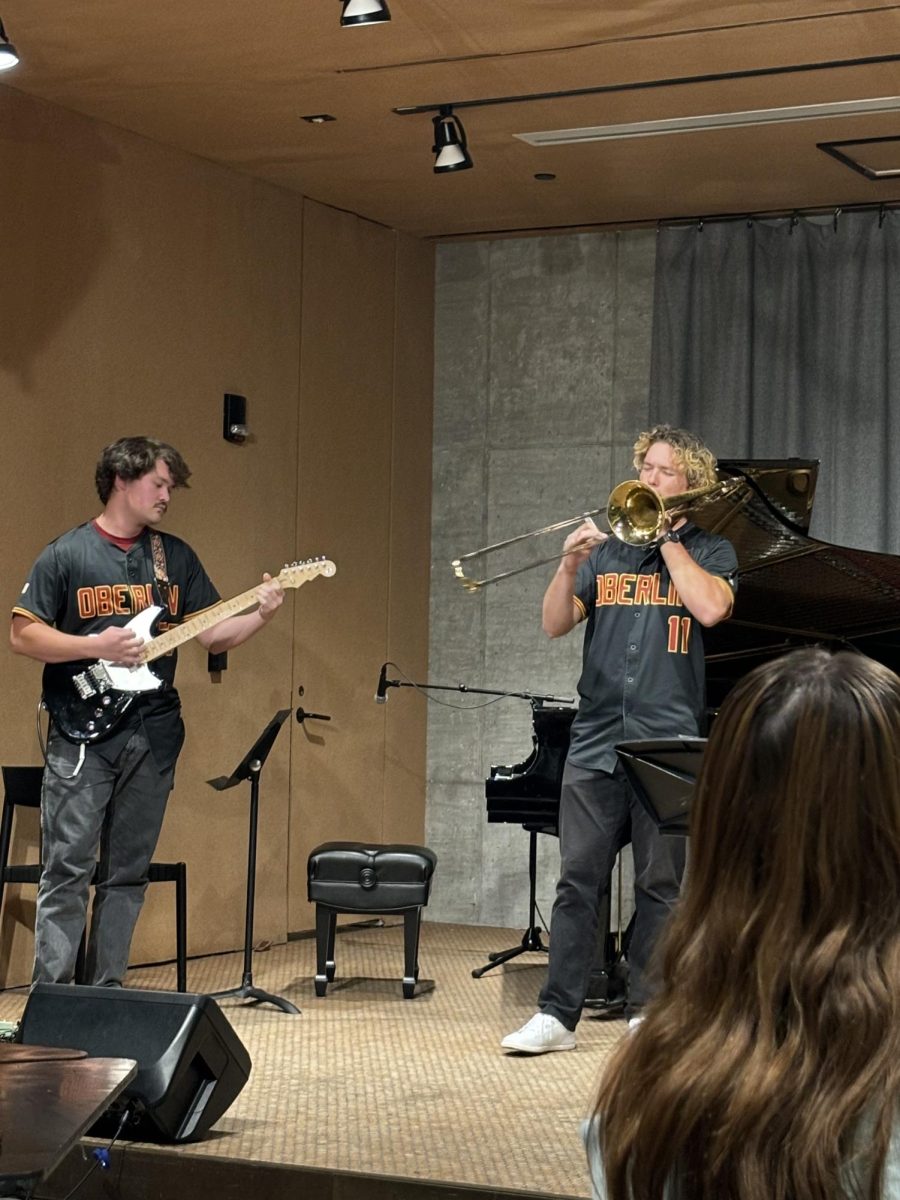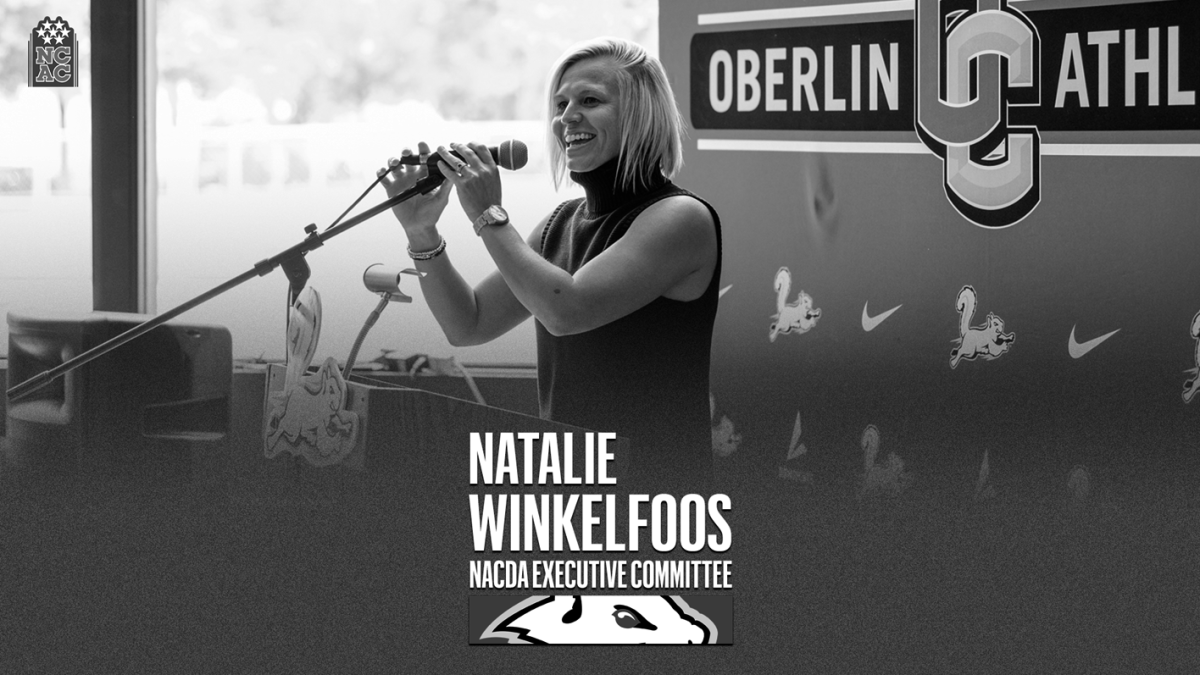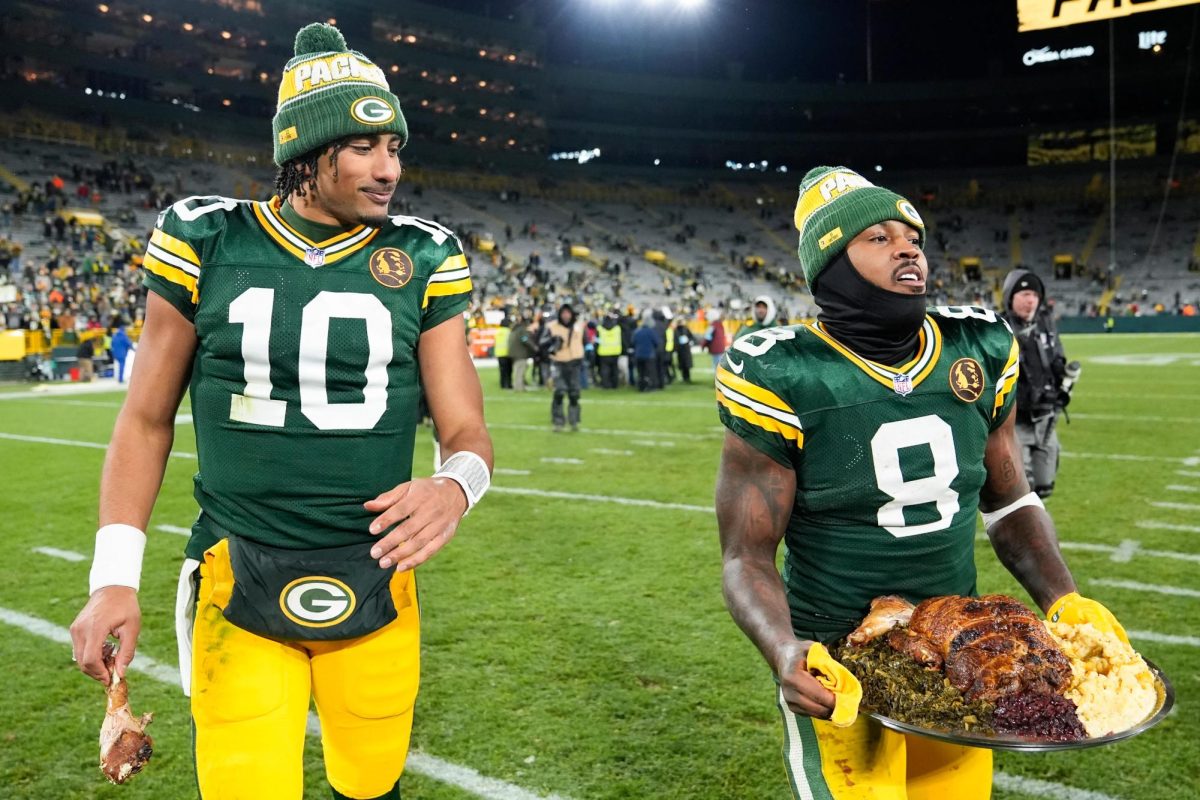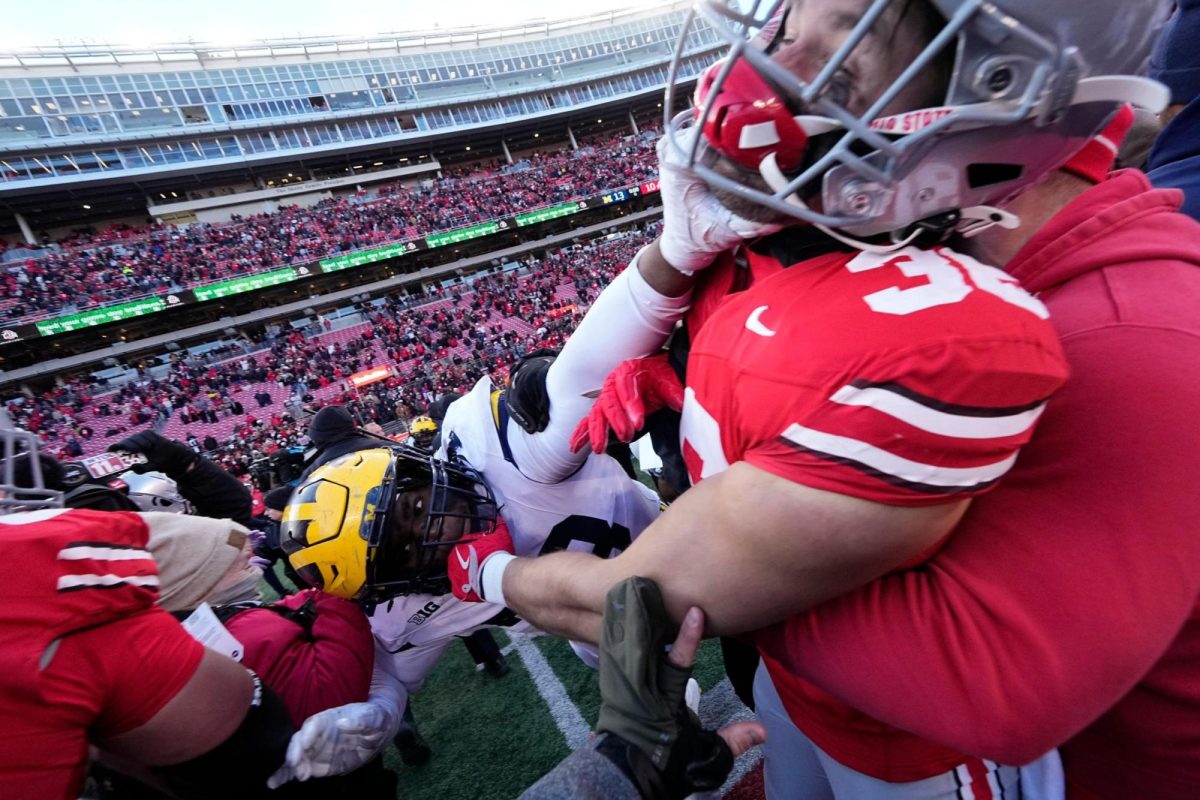A trombone rendition of baseball’s most tenured tune “Take Me Out to The Ball Game”, a piano solo of “Dorothea” by Taylor Swift, and a one-of-a-kind jazz performance of “I Wish” by Stevie Wonder are only a few of the incredible performances that took place this past Saturday at the ninth annual Sharing Stages, an event that highlights the student athletes in the Conservatory of Music and Department of Athletics.
Put together annually by Associate Professor of Jazz Studies Jay Ashby and Senior Associate Director of Athletics Creg Jantz, Sharing Stages took place at the Birenbaum Innovation and Performance Space. Located one stairwell beneath The Hotel at Oberlin, the venue is a club-like setting consisting of sleek black walls, dramatic overhead lighting and a bar full of free drinks, sandwiches, and mini cookies wrapped in tinfoil.
“It’s a really great space,” second-year right-handed pitcher and guitarist Davis Hayes said. “It brings out this feeling of creativity. It’s an intimate setting and a smaller venue; I think it adds to this creative ambiance.”
It’s easy to think music and sports are drastically different, but when put together, they provide an escape from the split society we face today.
“Sports and music in our society are two of the most unifying things,” third-year catcher and trombone player Anton Shelton said. “Everyone has a role and you’re all trying to come together to create a product you are proud of.”
In athletics, teams work for hours to perfect the onfield product. Whether it is working on a corner three in basketball, or shooting the right gap as a linebacker in football, or practicing bunt coverages just one more time as a pitcher to make sure you know where to go with a ball; sports requires repetition.
Music is no different. Musicians spend countless hours perfecting their own sound and learning how to incorporate it into the sound of the group to create a special listening experience.
Sharing Stages is one of Dean of the Conservatory William Quillen’s favorite events of the year. Students, faculty, coaches and staff from across the institution come together to celebrate students’ commonalities.
“Music is unique in its ability to allow all of us to come together and experience our collective humanity — both our own humanity, and the humanity of others,” Quillen said. “At a time when there are seemingly ever fewer opportunities to come together, the shared experiences afforded through collective musical experiences are more powerful and more important than ever.”
Oberlin student-athletes come from all across the world and are brought together by their sport.
“It’s a fantastic opportunity to showcase the artistry on our athletics teams and to, of course, celebrate the brilliance of our Conservatory students,” Associate Vice President for Athletics Advancement and Delta Lodge Director of Athletics & Physical Education Natalie Winkelfoos said. “Sharing Stages intentionally brings together performers on stage that you may not think go together — it’s a beautiful collision of creativity and expression.”
Quillen stated that this event offered himself and others the opportunity to learn more about and celebrate the multifaceted interests of students.
“Whether they’re student-athletes, musicians in the Conservatory, or students anywhere in our school, our students all enjoy a wide variety of interests, and it’s wonderful to have the opportunity to come together to celebrate our students’ talents,” Quillen said.
For Hayes, it was his first time performing in front of an audience.
Hayes admittedly has “not a crazy high level” of experience with the guitar and was grateful to be on the same stage as “world class musicians.”
Hayes had played guitar before coming to Oberlin, but being in an environment where music was integrated into everyday life encouraged him to further his pursuit.
“Being in an environment where music and the arts are just as important as every other facet of life, really brings out the most creative side of me,” Hayes said. “It fosters this creative spirit.”
Hayes’ teammate, Shelton, encouraged him to give Sharing Stages a go. Hayes lacked an extensive knowledge of music theory, yet for Shelton, that’s part of what makes Sharing Stages great, being able to play with athletes who may not consider themselves to be serious musicians.
“Maybe Davis might not know exactly what the harmony is doing over the bridge of ‘Don’t Let Me Down,’ or if Avery Ghosse, trumpet player and member of The Gym Rats, is playing a tritone or diminished line in his solo, but he’s still gonna hear it and experience it the same,” Shelton explained. “That’s the beauty of being able to play and experience this music with so many people from different backgrounds.”
Nine groups performed at this year’s sharing stages. Student-athletes from baseball, field hockey, women’s soccer, women’s lacrosse and men’s track and field were represented. Fourth-year saxophone player and vocalist Harrison Fink capped off his third consecutive appearance at Sharing Stages as a member of The Gym Rats. Fink enjoys playing year after year because his music is understood by everyone in the audience, albeit with different levels of understanding.
“Music is a language that transcends all barriers of language and age,” Fink said.
Every year, just when the final leaves start to fall, Sharing Spaces summons the ever-so-talented student athletes and first-rate Conservatory students to showcase how powerful the Oberlin community is; a place where talent is celebrated and exploring your differences is encouraged — differences that make Oberlin’s student-athletes special on the field and on the stage. Winkelfoos is grateful for the opportunity it gives students to connect, be seen, be heard and be celebrated.
“This gathering is a joy, a meaningful connection between disciplines that highlights just how extraordinary the Oberlin community is,” Winkelfoos said.
In the future, Sharing Spaces will continue to bring together all parts of Oberlin in a way few things can. Next year will be the 10th anniversary; both the athletics department and Conservatory look forward to it and are actively looking for more ways to unite.
“The commonalities between our areas are many,” Quillen said. “We’re always looking to expand and deepen these connections.”
When reflecting on his first ever performance and the environment Sharing Stages fostered, Hayes was struck by the affinity he felt on stage.
“We got the chance to create something together,” he said. “It didn’t matter what our music background was, we got to produce something that was beautiful.”












